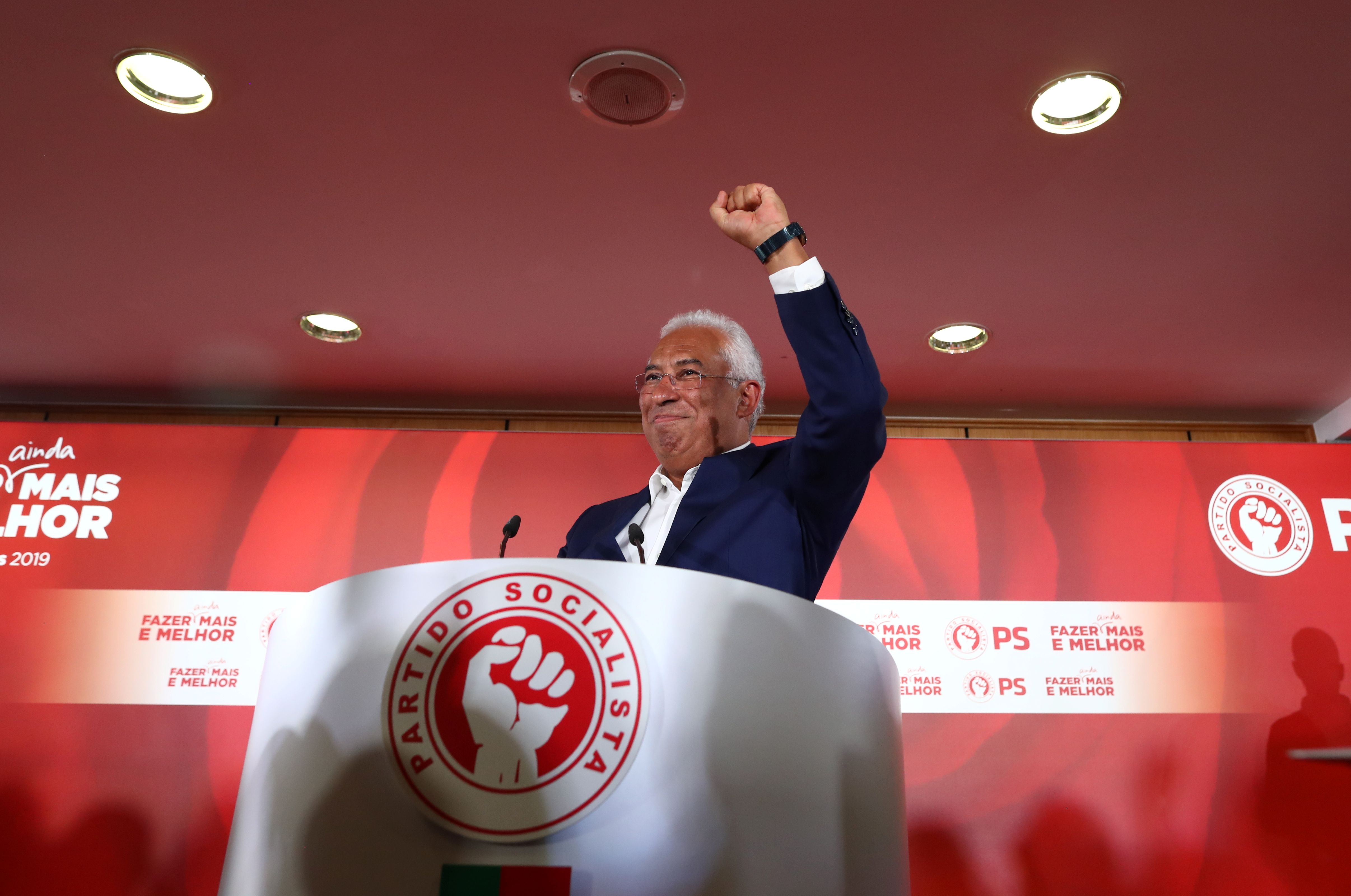Portugal's Socialists Stronger after Elections

PS won 36.65% of the votes and its MP count increased from 86 to 106 in the 230-seat parliament. In other results, the centre-right PSD picked up 77 seats, the Left Bloc (BE) won 19, the communist Unitarian Democratic Coalition (CDU) took 12, the conservative Social-Democratic Centre–Peoples Party (CDS-PP) won five, the environmentalist party People, Animals, Nature (PAN), 4, and some other smaller significant parties also gained seats.
Reasons for the Socialists’ Victory
PS built up its image as an anti-austerity party, contrasting it with PSD, which implemented austerity during its time in power in 2011-2015. During the peak in Portugal in 2012 of the global financial crisis, the country’s GDP decreased by 4%, unemployment increased to 15.8%, and public debt rose to 126.2% of GDP. The centre-right government, in return for a bailout from the EU, cut spending on healthcare, education, and public administration, decreased pensions, froze the minimal wage, and increased taxes. These actions led to a decrease in the budget deficit from 11.2% of GDP in 2011 to 4.5% in 2014 but public debt still increased to 130% of GDP in 2014. Simultaneously, unemployment increased to 17% in 2013 (and to 40% among those under 25 years old).
After taking power in 2015, the Costa government phased out austerity but also managed to reduce the budget deficit and public debt. As well, the government reduced the VAT tax on agricultural products and food from 23% to 13%, increased pensions, and raised the minimum wage from €505 in 2015 to €606 in 2019). PS also re-established four public holidays and the 35-hour workweek in public administration, all previously changed by PSD. The PS also introduced incentives for startups and foreign investors. These actions led to an increase in consumption and foreign direct investment (for example, Google opened an office in Lisbon). These factors, combined with increasing demand for tourism to Portugal and higher exports, boosted GDP growth by 2.5% annually in 2017 and 2018. This resulted in a decrease in unemployment to 6.2% in 2019. The higher GDP, employment, and minimum wage led, in turn, to higher state tax revenues and the ability to reduce the public deficit, which at the end of 2019 will be only 0.2%. The government also made use of the upturn in the financial markets to refinance Portugal’s public debt, reducing it to 118.8% of GDP.
The Costa government has maintained its support despite scandals, strikes, and unresolved social problems. PS voters seemed to overlook nepotism in the government, for example, Labour Minister José Vieira’s daughter Mariana is the chief of the government’s office, and Interior Minister Eduardo Cabrita’s wife, Ana Vitorino, is the maritime affairs minister. Even after a wave of teacher and nurses strikes for higher salaries in 2018 and 2019, the government didn’t lose popularity. Neither did it lose support after failing to quickly control a series of forest fires in the summer of 2017 that claimed more than 100 lives. The voters appeared to blame the underfunding of healthcare, education, and firefighting, on previous governments.
The New Government’s Challenges
Costa wants to establish a minority PS government with the support of BE and CDU, just as it was in its last term. During the campaign, though, CDU withdrew its support because the government hadn’t yet met the strikers’ demands. BE maintains its collaboration with PS but expects an increase in public spending; if not, the party may threaten to go into the opposition. A PS-led government also could be threatened by a simple censure motion if BE cooperates with right-wing parties, though that would be difficult to explain to BE’s own electorate. Another PS partner could be PAN. Its support would be contingent on the government following through on PAN proposals, such as a ban on the use of wild animals in circuses or restricting access to hunting. It also may be more politically advantageous for PAN to be in the opposition.
Weakness in the eurozone, the U.S. duties on food products from the EU, and Brexit may lead to less state revenue. About 40% of Portugal’s GDP is exports and the main destinations are Spain (20.9%), France (13.4%), Germany (10.7%), the UK (9.5%), and the U.S. (5.5%). Among the products that from 18 October will have an additional 25% duty to import into the U.S. are wine and olive oil, key products of the Portuguese economy.
Separate from the tariffs, Portugal faces long-term challenges, such as the depopulation of rural areas and a demographic crisis caused by emigration and ageing. Portugal’s population decreased from 10.5 million in 2012 to 10.3 million in 2017 while the population of rural areas decreased from 3.9 million in 2013 to 2.77 million in 2018. Migration from the countryside is spurred by the liquidation of public infrastructure in these areas, including schools, police stations, and health clinics. Simultaneous with the change from urban to rural, tourism has increased housing shortages in metropolitan Lisbon and Porto. The demographic problems so far have not been solved by additional immigration. Each year, Portugal still loses 5,000 more people than it gains.
PS’s European Policy Priorities
A PS government will continue to support French and Spanish approaches to integration. Similar to those countries’ positions, Portugal advocates the acceleration of EU decarbonisation and proposes the creation of a European fund to cope with environmental changes to support companies in this process. This transformation is to be financed by taxing polluting companies and digital giants. On migration policy, PS favours a “solidarity” mechanism for the allocation of persons applying for international protection between the EU Member States (so-called quotas). On economic issues, PS seeks a eurozone budget and an end to the use of sanctions under the excessive deficit procedure (EDP) in favour of rewarding countries that maintain fiscal discipline. The finalisation of the common market would facilitate the expansion of Portuguese companies, among others, retail giant Jeronimo Martins, one of the largest investors in Poland. PS also strives for high expenditures under the common agricultural policy and cohesion policy. On security, PS supports the development of an EU-level policy but emphasizes that it must be complementary, not competitive, to NATO. Also, given the high level of Chinese investment in Portugal (€10 billion in 2018.), the next Costa government will seek to intensify EU economic cooperation with China.
Conclusions
With support from BE and PAN, and given the differences between the opposition parties, the PS government will be stable, despite its minority character. If it continues to combine its active social policy with balancing the budget, it could maintain its high voter support for years. However, if state revenues fall, forcing a return to austerity, the government will lose the support of voters in favour of BE and CDU.
Portugal has been an example of a country that has managed to improve its economic situation by rejecting austerity. That argument will be used by the countries of Southern Europe in a bid to alleviate their situation given the stringent fiscal policy of the EU. The nomination of Italian Paolo Gentilioniego to the post of EU Commissioner for Economic and Monetary Affairs, as well as the persistent low inflation and low economic growth in the eurozone favour this change.
Poland and Portugal will remain on opposite sides in the debates on the decarbonisation of the EU economy, reform of migration and asylum policy, and the creation of a euro-area budget. However, the creation of a European fund to cope with environmental changes may be beneficial for Poland as a way to help pay decarbonisation costs. Poland and Portugal have a similar position on transatlantic relations and might cooperate on the finalisation of the common market and in EU budget negotiations. Both countries will fight for the most funds possible under the common agricultural policy and cohesion policy. With similar social problems and quality-of-life rankings, it is worth it for Poland and Portugal to cooperate in the creation of EU policies that improve housing, health, education, and rural development.


